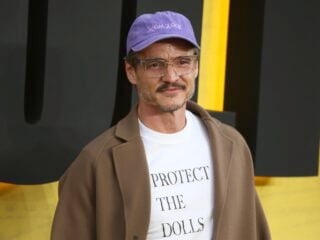Harry Potter author J.K. Rowling has doubled down on her controversial views on transgender in an epic 3,670-word essay to further try and explain herself.
J.K. Rowling is definitely not going to be a Grand Marshall at any pride parade. EVER!
“What I didn’t expect in the aftermath of my cancellation was the avalanche of emails and letters that came showering down upon me, the overwhelming majority of which were positive, grateful and supportive,” she wrote. “They came from a cross-section of kind, empathetic and intelligent people, some of them working in fields dealing with gender dysphoria and trans people, who’re all deeply concerned about the way a socio-political concept is influencing politics, medical practice and safeguarding.

“They’re worried about the dangers to young people, gay people and about the erosion of women’s and girl’s rights. Above all, they’re worried about a climate of fear that serves nobody – least of all trans youth – well.”
Rowling’s initial tweets were in response to an opinion piece titled, “Creating a more equal post-COVID-19 world for people who menstruate.” She poked fun at the article for not referring to “people who menstruate” as women.
That tweet resulted in comments calling her anti-trans because transgender, non-binary and gender-nonconforming people can also menstruate. She responded with this tweet:
Her initial comments lead actors Daniel Radcliffe and Eddie Redmayne to defend the trans community.
In the essay, Rowling addresses the backlash she has received and accusations of being a “TERF” (trans-exclusionary radical feminist) before breaking down her stance on transgender issues into five different points.
The author revealed she was “a domestic abuse and sexual assault survivor”, citing this alongside her belief in freedom of speech and experience as a teacher as reasons behind her position.
“I’m mentioning these things now not in an attempt to garner sympathy, but out of solidarity with the huge numbers of women who have histories like mine, who’ve been slurred as bigots for having concerns around single-sex spaces,” she wrote.
In her essay, Rowling writes of her own struggles with sexism and misogyny, and her adolescent sense of being “mentally sexless,” adding that reading accounts of gender dysphoria by trans men had made her wonder “if I’d been born 30 years later, I too might have tried to transition.”

“The allure of escaping womanhood would have been huge. I struggled with severe OCD as a teenager. If I’d found community and sympathy online that I couldn’t find in my immediate environment, I believe I could have been persuaded to turn myself into the son my father had openly said he’d have preferred,” she wrote.
Rowling said she had initially been moved to share her thoughts after reading about proposed “gender confirmation certificates” in Scotland, which will allow trans people to change sex on their birth certificates based on how they identify and not medical and psychiatric reports. She accused her critics of “groupthink” and “relentless attacks,” saying that while she believed trans people needed and deserved protection due to the high rates of domestic and sexual violence they endure, she did not agree that trans women who have not undergone hormone therapy or surgical transition should have access to single-sex spaces.
“When you throw open the doors of bathrooms and changing rooms to any man who believes or feels he’s a woman – and, as I’ve said, gender confirmation certificates may now be granted without any need for surgery or hormones – then you open the door to any and all men who wish to come inside. That is the simple truth,” she wrote.
She said the criticism had left her “in a very dark place inside my head, as memories of a serious sexual assault I suffered in my 20s recurred on a loop. That assault happened at a time and in a space where I was vulnerable, and a man capitalized on an opportunity. I couldn’t shut out those memories and I was finding it hard to contain my anger and disappointment about the way I believe my government is playing fast and loose with women’s and girls’ safety.”

Citing an unnamed poll, Rowling claimed that those who did not support preserving single-sex spaces were “only those privileged or lucky enough never to have come up against male violence or sexual assault, and who’ve never troubled to educate themselves on how prevalent it is.”
She said she had been contacted by “huge numbers” of women who were afraid to speak publicly about trans reforms, and decried institutions and organizations she once admired for “cowering before the tactics of the playground.” She said she believed misogyny and sexism were reasons behind the 4,400% increase in the number of girls being referred for transitioning treatment in the past decade.
“I’ve read all the arguments about femaleness not residing in the sexed body, and the assertions that biological women don’t have common experiences, and I find them, too, deeply misogynistic and regressive. It’s also clear that one of the objectives of denying the importance of sex is to erode what some seem to see as the cruelly segregationist idea of women having their own biological realities or – just as threatening – unifying realities that make them a cohesive political class … It isn’t enough for women to be trans allies. Women must accept and admit that there is no material difference between trans women and themselves,” she wrote.

Rowling ends her essay by asking readers to understand her point of view.
“I haven’t written this essay in the hope that anybody will get out a violin for me, not even a teeny-weeny one. I’m extraordinarily fortunate; I’m a survivor, certainly not a victim. I’ve only mentioned my past because, like every other human being on this planet, I have a complex backstory, which shapes my fears, my interests and my opinions. I never forget that inner complexity when I’m creating a fictional character and I certainly never forget it when it comes to trans people.”
She writes, “All I’m asking — all I want — is for similar empathy, similar understanding, to be extended to the many millions of women whose sole crime is wanting their concerns to be heard without receiving threats and abuse.”
I think we have all just found out who Voldemort really is.
- Pedro Pascal parts ways with stylist following fan backlash and death threat
- Quick Drag: Jaymes Mansfield dishes on her inspiration
- Celeb Snaps: Orville Peck, Rihanna, Seal, Jannik Sinner, and more
- Britney Spears trolls her fans with a baby adoption, Italy move Instagram post
- Rihanna’s sons don custom Jonathan Anderson Dior as the World’s best-dressed tots
- Jeremey Renner finally addresses his ex-wife’s ‘clickbailt’ allegation that he threatened to kill her
- Rosie O’Donnell’s gives scathing takedown of Donald Trump’s after citizenship threat
- Male Model Monday: Brandon Good, Henrique Fraga, Christian Hogue, and more












![Apple Watch Series 10 [GPS 42mm case] Smartwatch with Jet Black Aluminium Case with Black Sport Band - S/M. Fitness Tracker, ECG App, Always-On Retina Display, Water Resistant Jet Black Aluminium Case with Black Sport Band 42mm case + Small/Medium band GPS Without AppleCare+](https://m.media-amazon.com/images/I/6105jZyXyPL._AC_SL1500_._SL160_.jpg)



